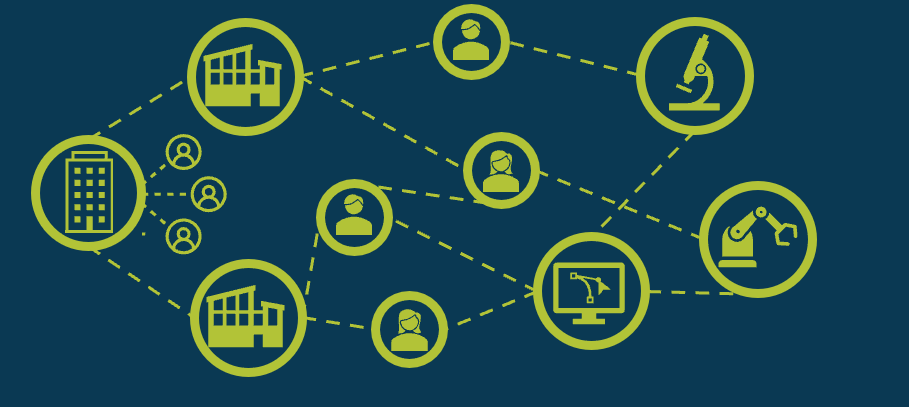Materials Informatics
We empower organizations to harness data and knowledge to solve complex and impactful challenges in materials science and manufacturing. Our mission encompasses addressing critical societal issues, including adoption of AI, data privacy, energy transition, and climate change, by applying innovative and sustainable solutions within the materials domain. We are committed to advancing German and European research and industries while building global partnerships for the benefit of all. We focus on delivering user-centric, data-driven, and transformative digital solutions that shape the future of materials innovation and product manufacturing.
R&D services for Materials Informatics
Dataspaces
We build and deploy software platforms for seamless integration and in-depth analysis of data and processes, with a particular focus on manufacturing processes, enabling organizations to unlock the full potential of their information assets. Whether data resides in diverse formats, fragmented systems, or disparate locations, our solutions are designed to bring them together into a unified, actionable framework. By addressing the complexities of modern data management, we empower businesses to overcome barriers, enhance decision-making, and drive innovation through comprehensive insights and efficient workflows.
Digital Ecosystems
We design and implement digital ecosystems that enable seamless data interoperability and sharing across platforms and institutions, empowering organizations to streamline their workflows, harness knowledge-generating apps, and optimize process design and documentation for enhanced collaboration and innovation.
Ontologies
We create and maintain standard vocabularies and ontologies to enable the harmonized representation of materials data, bridging the gap between diverse systems and ensuring seamless integration, interoperability, and intelligent insights for advanced applications.
AI solutions
We develop predictive and generative models as well as optimization strategies for materials manufacturing using machine learning and artificial intelligence techniques. Our expertise spans materials and process design, knowledge representation, extraction, and processing as well as web application development and natural language interfaces, enabling us to deliver tailored solutions that drive innovation and efficiency.
Why should my company collaborate with the Fraunhofer IWM regarding Materials Informatics?
User-Centric Interfaces for All Skill Levels
Our software solutions feature intuitive, low/no-code graphical interfaces designed for engineers and scientists, not just programmers. This empowers your teams to explore, analyze, and act on materials data without needing deep coding expertise.
Data Privacy and Secure Deployment
We prioritize your data sovereignty. Our solutions support secure on-premise deployment, fine-grained access control, and advanced user and data management, ensuring compliance with internal policies and external regulations.
Tailored Solutions, Powered by Our Technology Stack
We apply our flexible, modular technology stack to your specific use case, developing the solution together to address your most pressing materials and manufacturing challenges. The result: fast, focused implementation that fits seamlessly into your workflows.
State-of-the-Art Digital Technologies for Materials and Manufacturing-Centric Challenges
We combine advanced computer science, including AI, semantic technologies, scalable architectures like Kubernetes, and seamless data integration, to deliver powerful, future-ready solutions tailored to the complex needs of materials science and manufacturing.
Customer focused R&D-Transfer
- We engage in direct communication with potential customers to gather detailed market requirements and pain points. This hands-on approach ensures our solutions are precisely aligned with real-world needs, enabling faster innovation and greater industry impact.
- Our expert Team MI partners with your organization to tackle your toughest materials and manufacturing challenges. Offering flexible, on-demand support, we bring tailored data strategies, analysis, and technology to accelerate your projects and decision-making processes.
- We provide customized workshops and training sessions to upskill your teams in materials informatics, data management, and emerging digital technologies. Empower your workforce with practical knowledge to leverage data-driven approaches and boost innovation.
- We partner with your company on joint research and pilot projects to co-develop and validate innovative materials informatics solutions. This hands-on collaboration targets your specific challenges, delivering practical insights and breakthroughs tailored to your needs.
Select projects and applications
- MarketPlace (EU) - Materials Modelling Marketplace for Increased Industrial Innovation
- Oyster (EU) - Open characterisation and modelling environment; Open Innovation Environment (OIE)
- NanoMECommons (EU) - Harmonisation of EU-wide nanomechanics protocols and relevant data exchange procedures
- Apache (EU) - Active & intelligent Packaging materials and display cases as a tool for preventive conservation of Cultural Heritage
- ReaxPro (EU) - Software Platform for Multiscale Modelling of Reactive Materials and Processes
- SimDome (EU) - Digital Ontology-based Modelling Environment for Simulation of materials
- Intersect (EU) - Interoperable Material-to-Device simulation box for disruptive electronics
- EOSC-Pillar (EU) - EOSC-Pillar aims to coordinate national Open Science efforts across Austria, Belgium, France, Germany and Italy, and ensure their contribution and readiness for the implementation of the European Open Science Cloud (EOSC)
- FORCE (EU) - Formulations and Computational Engineering
- OntoTrans (EU) - Provides an ontology-based Open Translation Environment
- OntoCommons (EU) - Ontology-driven data-documentation for industry commons
- SimPhoNy and Open Simulation Platform - SimPhoNy is an ontology-based open-source Python framework that promotes and enables interoperability between any 3rd-party software tool
2025
Nahshon, Y.; Morand, L.; Büschelberger, M.; Helm, D.; Kumaraswamy, K.; Zierep, P.; Weber, M.; de Andres, P., Semantic orchestration and exploitation of material data: A dataspace solution demonstrated on steel and copper applications, Advanced Engineering Materials 27/8 (2024) Art. 2401448, 21 pp. Link
Roters, F.; Aslam, A.; Bai, Y.; Büschelberger, M.; Bulgert, K.; Butz, A.; Hickel, T.; Jogi, T.; Klitschke, S.; Martin, M.; Meyer, L.-P.; Morand, L.; Nahshon, Y.; Radtke, N.; Saikia, U.; Trondl, A.; Wessel, A.; Zierep, P.; Helm, D., StahlDigital: Ontology-Based Workflows for the Steel Industry, Advanced Engineering Materials Online first (2025) Art. 2402148, 13 pp. Link
2024
Fliegener, S.; Rosenberger, J.; Luke, M.; Dominguez, J.; Morgado, J.; Kobialka, H.; Kraft, T.; Tlatlik, J., Digital methods for the fatigue assessment of engineering steels, Advanced Engineering Materials (2024) Art. 2400992, 17 pp. Link
Nahshon, Y.; Morand, L.; Büschelberger, M.; Helm, D.; Kumaraswamy, K.; Zierep, P.; Weber, M.; de Andres, P., Semantic orchestration and exploitation of material data: A dataspace solution demonstrated on steel and copper applications, Advanced Engineering Materials (2024) Art. 2401448, 21 pp. Link
 Fraunhofer Institute for Mechanics of Materials IWM
Fraunhofer Institute for Mechanics of Materials IWM


